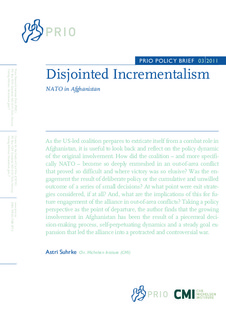| dc.contributor.author | Suhrke, Astri | |
| dc.date.accessioned | 2018-01-04T08:17:22Z | |
| dc.date.available | 2018-01-04T08:17:22Z | |
| dc.date.issued | 2011-01-01 | |
| dc.identifier | oai:www.cmi.no:4468 | |
| dc.identifier.citation | Oslo: PRIO (PRIO Policy Brief no. 03/2011) | |
| dc.identifier.isbn | 978-82-7288-397-2 | |
| dc.identifier.uri | http://hdl.handle.net/11250/2474742 | |
| dc.description.abstract | As the US-led coalition prepares to extricate itself from a combat role in Afghanistan, it is useful to look back and reflect on the policy dynamic of the original involvement. How did the coalition – and more specifically NATO – become so deeply enmeshed in an out-of-area conflict that proved so difficult and where victory was so elusive? Was the engagement the result of deliberate policy or the cumulative and unwilled outcome of a series of small decisions? At what point were exit strategies considered, if at all? And, what are the implications of this for future engagement of the alliance in out-of-area conflicts? Taking a policy perspective as the point of departure, the author finds that the growing involvement in Afghanistan has been the result of a piecemeal decision-making process, self-perpetuating dynamics and a steady goal expansion that led the alliance into a protracted and controversial war. | |
| dc.language.iso | eng | |
| dc.publisher | PRIO | |
| dc.relation | PRIO Policy Brief | |
| dc.relation | 03/2011 | |
| dc.relation.ispartof | PRIO Policy Brief | |
| dc.relation.ispartofseries | PRIO Policy Brief 03/2011 | |
| dc.relation.uri | https://www.cmi.no/publications/4468-disjointed-incrementalism-nato-in-afghanistan | |
| dc.title | Disjointed Incrementalism. NATO in Afghanistan. | |
| dc.type | Research report | |
